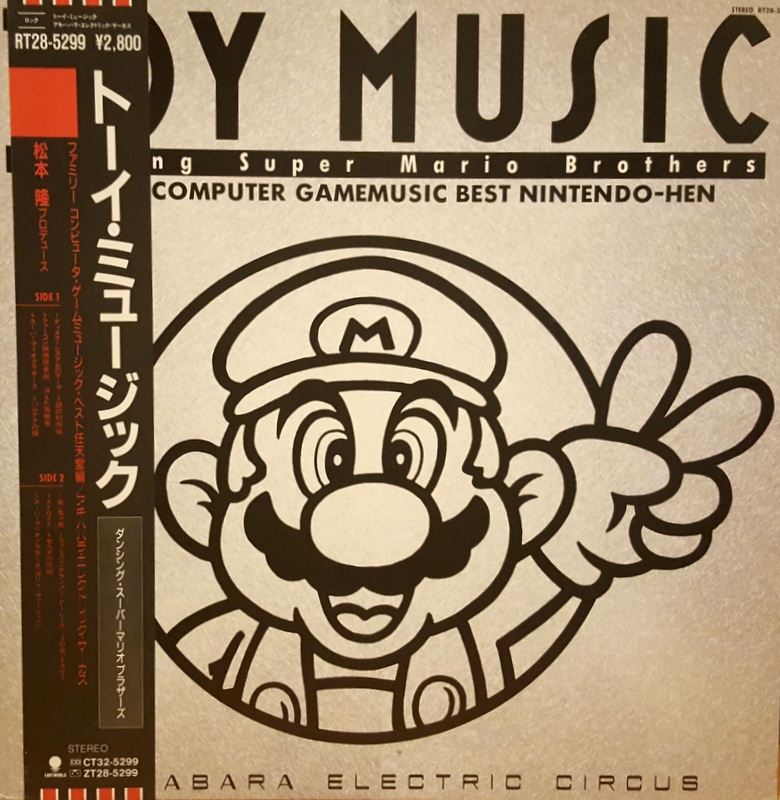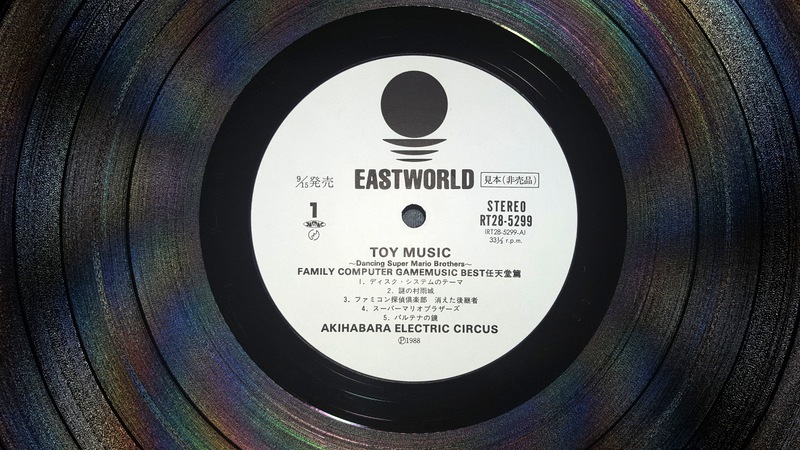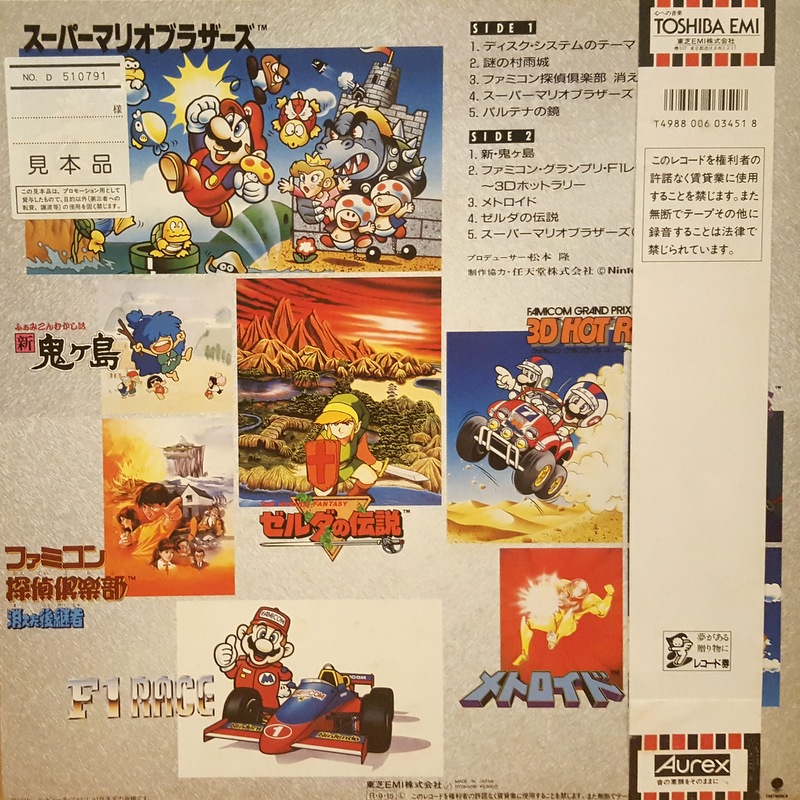Game Music Revue: Toy Music – Dancing Super Mario Brothers

- Credited Performer: Akihabara Electric Circus
- Released September 15, 1988
- Label: Eastworld/Toshiba
- VGMdb Information Page
In 1988 a group by the name of Akiharbara Electric Circus released two arranged game music albums. One featured nothing but reworked version of music from Super Mario Bros. 3. It’s a weird record.
The other is this, Toy Music: Dancing Super Mario Bros.
It’s fucking batshit.
But first, a bit about Akihabara Electric Circus. On this album they’re credited as a duo, on the other record, a fivesome. But regardless of who they actually were, the mastermind behind the group was Hideki Matsutake, longtime Yellow Magic Orchestra collaborator and sequencer programmer extraordinaire. Credited alongside him as a member proper is Jun Irie, a producer/arranger who’s worked on some anime as well as Konami classics such as Gradius and Castlevania. Working with a producer credit here, but given full credit as a proper member on the group’s other album is Takashi Matsumoto. He’s another artist with YMO connections, having worked with Haruomi Hosono in his pre-YMO groups Apyrl Fool and Happy End. Outside of that, he’s mostly worked behind the scenes as a producer.
That’s a hell of a pedirgree for an album of bizarre game music covers.
And really, this is a bizarre record. At first I was going to write it off as bad, but it’s too eccentric to really be bad. Even when I don’t like it, I respect it’s incredible willingness to embrace what just seems like a series of the most bizarre choices imaginable at all times.
This is a record filled with exceptionally odd choices. A reworking of Beethoven’s Ninth (Fourth Movement) is interjected into the theme to Nazo No Murasame Jou. Three or four layers of drum beats and disco production are put in over the traditional Japanese musical arrangements of Shin Onigashima. In both cases, its almost like Matsutake and company had pre-existing ideas for what they wanted to record, and just worked the game music around them for whatever reason. The same goes for “Parthena’s Mirror,” the theme to Kid Icarus. The instantly recognizable melody is taken to the background here, and pushed into the front of the mix is a seemingly endless parade of drums that sound like something a marching band might lay down. Again, it’s not exactly a bad choice, but…why?

They cover the theme to Metroid. Think about the music to Metroid for a second. Think about that eerie silence of the opening theme. Remember the triumphant feeling of exploration and adventure that the main title music creates. And then there’s Kraid’s theme, so simple, yet so bizarre and creepy, creating so very much with so little. It’s a masterpiece of minimalism. Here we get a five minute greatest hits version of all that, with an omnipresent (and reverbed to hell and back) drum beat thrown over it. Did they call in Phil Collins to guest on this one? It’s certainly fun (jaunty even) but they somehow managed to take the Metroid theme and strip the Metroid out of it.
The love for drums (synthesized or otherwise) really shows up hard in the Super Mario Bros. track, a medley of the main game’s themes. The overarching dance beat isn’t all that out of place, it certainly helps to convey the bouncy, fun atmosphere of the game. I don’t know if I’d say the same about the sudden drum solo that plays alongside the brief interlude into the underworld theme though. It’s certainly unique, that’s for sure.
But we get peak weirdness with the penultimate track, and nearly six-minute version of the Zelda theme…kind of. The opening is the straight-up The Legend of Zelda theme, that instantly recognizable motif that sounds as timeless and beautiful now as it did over 30 years ago. Sure, it has that same drum beat accompaniment that seems to be on most of tracks here, but so far nothing that outrageous.
And then the narration kicks in.
The robot narration.
Yup, as we travel from one theme to another, overworld, underworld and boss music, what sounds like a rather depressed little robot pops up from time to time to inform up as to what, exactly, The Legend Of Zelda is. He goes into all the detail, covering the two triforces, the history of the Princess, Ganon’s stealing one of the triforces, and Link’s mission to rescue the princess and find the other triforce. It’s like Kraftwerk’s “The Model” mixed in with Lord Of The Rings.

I don’t know if that’s an endorsement of a condemnation. In fact after listening to this album several times over I still can’t wrap my head around it or how I feel about it. Like I’ve said numerous times by now, It’s certainly unique. And they make some pretty broad departures from the original material, which is what I’m usually looking for in an arranged game music album. But while I’ll give them points for moxy, I just don’t think the choices they made, however original they may be, were particularly good ones. Or maybe they were at one point but just haven’t aged well. This is actually a recurring problem in a lot of Matsutake’s later work, extremely dated, overly busy production bogging down otherwise good songs. It’s like he didn’t know what to do once he walked away from an analog sequencer and in front of a fully digital keyboard with near-limitless samples. I think he worked better with the limitations of the 70s hardware.
Still, it’s an utterly fascinating and bizarre record. And I’m glad I was able to stumble across an incredibly rare vinyl copy, because this sucker is crazy hard to find. While you can usually pick up a copy of Akihabara Electric Circus’ Super Mario Bros. 3 for less than 5,000 yen ($50), this one goes for two to four times that. I don’t know if they didn’t make a lot of the first time around, or if the YMO fans out there gobbled it up because of the association to the group. But whatever the reason, if you want to hear this wackiness for yourself (legally) it’ll cost you. And with that in mind today, I really can’t recommend it. If you’re going to shell out over $100 for a game music release, there are far better big-ticket items you could go after. The Super Mario World soundtrack, for example, or anything by Yuzo Koshiro.
But you can find this sucker online relatively easily. So if you’re looking for a laugh, and want to hear what a German techno version of the Zelda theme might sound like, then by all means, seek it out.
Leave a Reply